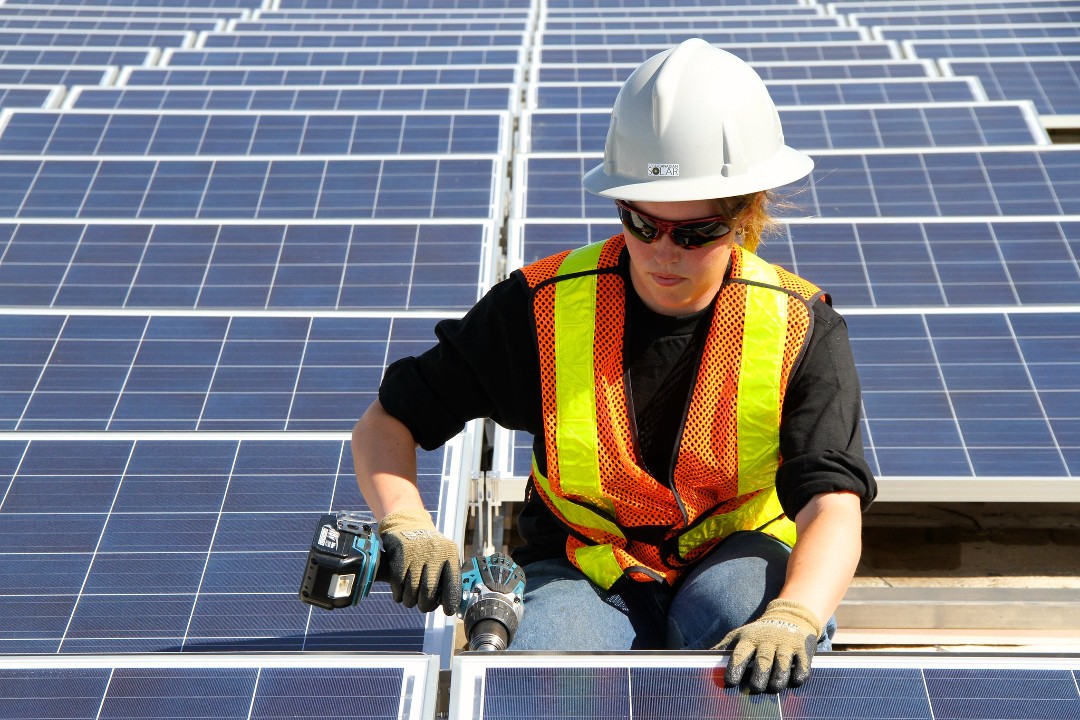Edmonton has proposed amending the zoning bylaw to require all new buildings to be constructed in ways that make them ready to add solar power and electric vehicle chargers, among several other changes.
In October, after council finished its marathon public hearing on the new bylaw, it asked administration to prepare bylaw amendments based on resident feedback. One feedback theme was that the bylaw didn't do enough to address climate change.
Administration has now proposed 15 action items that would further embed climate action into the bylaw and other city planning processes. The proposed changes are scheduled to be presented in a city report to council's urban planning committee on Oct. 29.
Amendments to the zoning bylaw that city administration is proposing could require all new buildings to be constructed to support solar power generation. The report said retrofitting an existing building to be solar-ready is more expensive than constructing it with that option baked in, and that having this option allows homeowners to choose whether they want to add solar panels. Administration said it will ensure the regulations do not conflict with the provincial Safety Codes Act, which includes the Alberta building code regulations. The code regulates energy efficiency and prohibits municipalities from requiring a higher standard of energy efficiency.
In the report, city administration used the same rationale to describe its proposed amendments to require all new buildings to be constructed in ways that allow one to add EV chargers. The amendments will be prepared so they don't conflict with provincial regulations, the report said.
Other changes proposed for the bylaw are new regulations for wildfire risk areas. The report said as Edmonton's climate becomes warmer and drier, the city could experience more fires, especially in areas where homes and other human activity are adjacent to forested areas. Administration proposes adding FireSmart regulations into the zoning bylaw to help mitigate these risks.
The city is also assessing flood risk for the North Saskatchewan River to reflect climate projections in more detail. The report said staff will use this study and new provincial flood maps to update the floodplain protection overlay in the zoning bylaw.
Administration is also proposing to explore how to improve landscaping requirements in the zoning bylaw. The report describes resilient landscaping, which includes the use of drought-resistant species, native plants, low-impact development, and improved parking lot landscaping. Administration said it will also explore how to get more developers to comply with the zoning bylaw's landscaping requirements by changing how it collects landscape securities, a deposit used to ensure developers meet requirements. Developers would need to submit the security just after receiving a development permit and would receive 80% of it back if they pass an initial landscape inspection. The remaining security would be returned after a two-year landscape inspection.

Proposed amendments to the zoning bylaw could see the bylaw require new construction to be ready to accept solar panels and EV chargers. (David Dodge/Flickr)
Another report, scheduled for presentation to the committee, explores how the city could incentivize retaining trees on private property. The city considered amendments to the zoning bylaw, but "the analysis and feedback … suggest that their potential effectiveness may be limited," the report said.
Outside of the zoning bylaw, reports prepared for the urban planning committee meeting note the city may pursue incentives for climate-resilient development. Previous grant programs like the solar rebate program and the home energy retrofit accelerator program have helped more than 2,000 people upgrade their homes, the report said. Administration said it will launch new programs to incentivize buildings to be built that are more energy-efficient than codes require. The city said it will also develop a streamlined permitting process for structures that are built to a standard higher than provincial regulations. This would help reduce costs and improve certainty for applicants, the report said.
Some items in the report are already underway, and others, like amendments to the text of the zoning bylaw, would require a council vote and possibly a public hearing.
